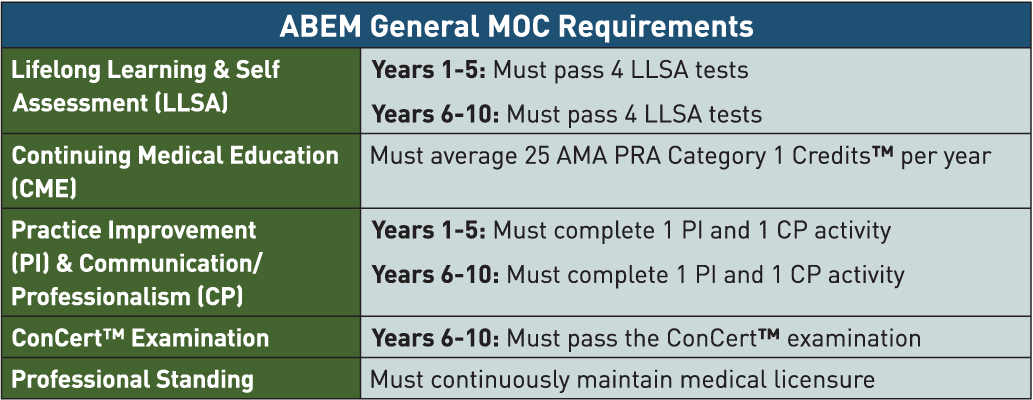Whether you are a first-year medical student or a graduating senior resident, standardized testing has undoubtedly been a significant hurdle in your career. Most of us probably recognize that, in order to become “board-certified” in emergency medicine upon completion of residency training, we need to successfully pass both the American Board of Emergency Medicine (ABEM) qualifying and oral examinations. Yet, few know what happens after achieving board certification status. What has ABEM defined as the requirements necessary for maintenance of certification (MOC)? What is the allotted time period to complete these required activities? To help address these questions, we enlisted the help of current ABEM president, James H. Jones, MD.
How would you describe the MOC process for residents, and what do the various parts of the MOC represent?
The ABEM MOC Program is a pathway for emergency physicians to be engaged in continuous professional development that is relevant to the practice of emergency medicine and adheres to a national standard. Every medical specialty board under the purview of the American Board of Medical Specialties (AMBS) must have a MOC program that contains professional standing (a medical license requirement), lifelong learning and self-assessment (LLSA), continuing medical education (CME) requirements, engagement in performance improvement and improving the patient encounter (patient communication), and a secure examination that assesses diagnostic reasoning and the assessment of knowledge application to clinical scenarios (the Continuous Certification examination, or ConCert™ exam).
There are a number of different requirements necessary for MOC. How long do I have to complete these?
Certification is a lifelong commitment, not a single event after residency. As soon as you are certified (after passing the oral examination), you are automatically enrolled in the ABEM MOC Program. The MOC cycle consists of two five-year periods. Requirements must be completed during the five-year window, and the ConCert™ exam must be passed in the second five-year MOC cycle (essentially every 10 years).
What are the lifelong learning and self-assessment tests, and what is the time period required to pass them?
The LLSA tests are based on a series of articles selected by ABEM from submissions by members of the EM community. After reading the articles, physicians take a 20-30 question open-book test. ABEM suggests that this can be done in a group setting. It's much like having a national, specialty-based journal club. ABEM-certified physicians must pass four LLSA tests every five years. They do not need to pass a specific year's LLSA test in that year. Each LLSA test is available online for three years.
Many attending physicians talk about CME credit. How many CME credits are necessary for MOC, what qualifies as valid CME, and how do I submit and keep track of my CME credits?
ABEM requires physicians to complete 25 credits of AMA PRA Category 1 CME every year (on average). Physicians routinely track their own CME, which is largely required for state medical licensure and hospital credentialing. At this time, physicians only need to attest to meeting this requirement — they do not need to submit proof of completing CME unless they are being verified by ABEM.
What is the ConCert™ examination and when should I take it?
The ConCert™ examination is a secure, computer-based examination, delivered at testing centers across the nation. You must pass the ConCert™ exam in the second five-year period of your MOC cycle (essentially every 10 years). ABEM suggests that physicians take the ConCert™ exam during years eight or nine in the certification cycle. If you take it the final year and do not pass, you could become decertified. There is no downside to taking the ConCert™ one to two years earlier than the expiration date on your certificate.
Are there any other requirements necessary for MOC?
Most physicians have no difficulty meeting the professional standing requirements. Nonetheless, there are a few details about the requirement that might be important to some physicians. In order to be ABEM-certified, you must have at least one current, active, valid, full, unqualified, and unrestricted medical license in the U.S., a U.S. territory, or Canada. In addition, every license that you possess from every state in which you hold a license must be unqualified and unrestricted.
ABEM-certified physicians must be involved in measuring and improving their practice. In most cases, measures already used in the emergency department will meet the ABEM requirement. Physicians attest to completing these activities on the ABEM website.
ABEM requires that you be involved in an assessment of the patient experience of care. This is almost universally met by being involved in some type of patient satisfaction process or survey. If your emergency department does not do this, you can download a free, validated survey form from the ABEM website. Physicians attest that they participate in an acceptable communication/professionalism activity.
We would like to thank Dr. James Jones, Dr. Rebecca Smith-Coggins, and Dr. Earl Reisdorff of ABEM for their time in helping us understand what is needed to maintain our hard-earned board-certified status. More information can be found at www.abem.org.




